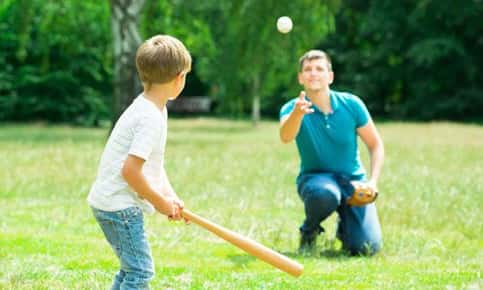
A Marsden ball might not look very impressive, but this little ball offers big benefits for athletes and children affected by strabismus, ambylopia and other conditions. Marsden ball exercises are just one of the techniques that vision therapists use to help patients make better use of their vision.
What Is a Marsden Ball?
Marsden balls are used in used for a variety of vision therapy exercises. The hollow rubber balls are about four inches in diameter and dangle from the ceiling on a string attached to an i-hook. Depending on the exercise, the ball may feature letters, numbers, colors or a combination of letters and colors.
Why Are Marsden Balls Used?
Every initial visit to a vision therapist involves a thorough examination to identify issues that may prevent you from using your vision fully. Once your therapist identifies the source of your problem, he or she creates a treatment plan that includes both low-tech and high-tech therapies, including computer software, prisms, lenses, filters, games and exercises. The Marsden ball, one of the low-tech options, is often used if you or your child has one of these problems or conditions:
- Difficulty using both eyes together
- Hand-eye coordination problems
- Poor visual tracking skills
- Amblyopia (lazy eye)
- Strabismus (crossed eyes)
- Problems with visual spatial processing
- Traumatic brain injuries
- Autism spectrum disorders
Marsden ball exercises can also help an athlete improve his or her performance. Hand-eye coordination and tracking are essential skills for many types of sports. For example, poor tracking skills may make it difficult to tell where a baseball or softball will land. The exercises also improve peripheral vision, allowing an athlete to see action on the sides of the field or court without turning his or her head.
How Does the Marsden Ball Work?
Sometimes the simplest solutions are the most effective. During Marsden ball exercises, the vision therapist sets the ball in motion and asks the patient to perform a variety of tasks, such as calling out the letters they see on the ball. While performing the exercises, patients are asked to keep their heads still and move their eyes to identify letters or colors. Marsden ball exercises are sometimes performed on wobble boards or other devices that help improve balance. Depending on the exercises, patients are asked to sit, stand, walk or lie down while keeping their focus on the balls. The balls can be raised or lowered as needed.
Marsden ball exercises are just one vision therapy technique that can help improve common vision disorders, make reading easier and improve sports performance. Would you like to find out if vision therapy can help you? Call us to schedule an appointment.
Sources:
Optometry Times: Vision Therapy: A Top 10 Must-Have List
Vision Care Institute: Be the Best You Can Be
Review of Optometry: Treating Patients on the Autism Spectrum, 4/5/11
https://www.reviewofoptometry.com/article/treating-patients-on-the-autism-spectrum


